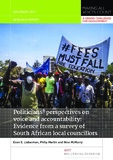| dc.contributor.author | Lieberman, Evan S. | |
| dc.contributor.author | Martin, Philip | |
| dc.contributor.author | McMurry, Nina | |
| dc.coverage.spatial | South Africa | en |
| dc.date.accessioned | 2017-12-07T08:43:35Z | |
| dc.date.available | 2017-12-07T08:43:35Z | |
| dc.date.issued | 2017-12 | |
| dc.identifier.citation | Lieberman, E.S.; Martin, P. and McMurry, N. (2017) Politicians’ perspectives on voice and accountability: Evidence from a survey of South African local councillors, Making All Voices Count Research Report, Brighton: IDS | en |
| dc.identifier.uri | https://opendocs.ids.ac.uk/opendocs/handle/20.500.12413/13413 | |
| dc.description.abstract | A growing body of research exists on democratic accountability. Much of this research focuses on citizen strategies for expressing their views, and on efforts to hold politicians and government service providers accountable. Despite this research, we in fact know little about how politicians in young democracies view these aspects of democratic governance. Given that accountability can be understood as a feedback ‘loop’ between citizens and elected representatives, it is necessary to gain a better understanding of the norms and values of politicians themselves, the pressures they face and the ways that they communicate with their constituents. This paper details findings from an original survey of approximately 1,000 South African councillors in 2016 and 2017 to explore what representation and accountability looks like from their perspective. How do they understand the various links in the accountability chain, including citizen input and deliberation, norms of good government and pressures from political parties, friends and family? The quality of democratic accountability, and the success of interventions to improve citizen representation, may depend on the norms and beliefs held by elected representatives. Findings state that even in a political context defined by strong parties, the descriptive representation of South African politicians has important substantive implications. Individual-level characteristics such as the race, gender, wealth and age of councillors meaningfully predict attitudes and perceptions on a range of important questions about voice and accountability. | en |
| dc.description.sponsorship | DFID | en |
| dc.description.sponsorship | USAID | en |
| dc.description.sponsorship | Sida | en |
| dc.description.sponsorship | Omidyar Network | en |
| dc.language.iso | en | en |
| dc.publisher | Institute of Development Studies | en |
| dc.relation.ispartofseries | Making All Voices Count Research Report; | |
| dc.rights | Attribution-NonCommercial-NoDerivs 2.0 UK: England & Wales | * |
| dc.rights.uri | http://creativecommons.org/licenses/by-nc-nd/2.0/uk/ | * |
| dc.subject | Governance | en |
| dc.subject | Participation | en |
| dc.subject | Technology | en |
| dc.title | Politicians’ perspectives on voice and accountability: evidence from a survey of South African local councillors | en |
| dc.type | Series paper (non-IDS) | en |
| dc.rights.holder | Institute of Development Studies | en |
| rioxxterms.funder | Default funder | en |
| rioxxterms.identifier.project | Default project | en |
| rioxxterms.version | NA | en |
| rioxxterms.funder.project | 9ce4e4dc-26e9-4d78-96e9-15e4dcac0642 | en |


